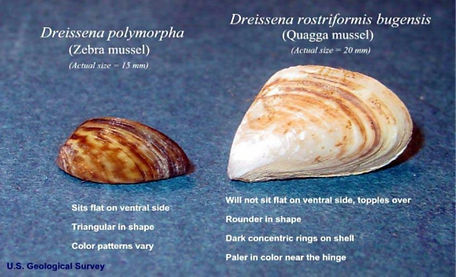
A program of the Bonner Soil and Water Conservation District, the Lake Assist program provides assistance to Bonner County residents on water quality concerns and suggestions on how to reduce pollutants to our abundant lakes, rivers, streams and groundwater.
Lake Assist
Quagga mussel
(Dreissena rostriformis bugensis)
Quagga mussels are a non-native freshwater mussel that attach to hard and soft surfaces. They spread rapidly and clog pipes that deliver water for drinking, energy, agriculture, recreation, and a variety of other uses. They also can negatively affect fish populations and wildlife habitat.
If left to spread untreated, they form dense colonies that damage and hinder infrastructure so severely it would cost hundreds of millions of dollars in actual and indirect costs.
Zebra mussel
(Dreissena polymorpha)
Native to the lakes of southeast Russia including the Black and Caspian Seas, it gets its common name from the zebra-type striping on the shells. They are small and typically grow to the size of a fingernail. As a small freshwater mussel, it competes with native species and can cause damage to infrastructure and form dense colonies.
Both types of mussels spread when boats are not typically cleaned and dried adequately and contaminated watercraft are moved to where the mussels can be introduced. They can survive 3-5 days out of water. Please clean, drain and dry your motorized or non-motorized watercraft.

Quagga mussel 101 information from Idaho State Department of Agriculture.